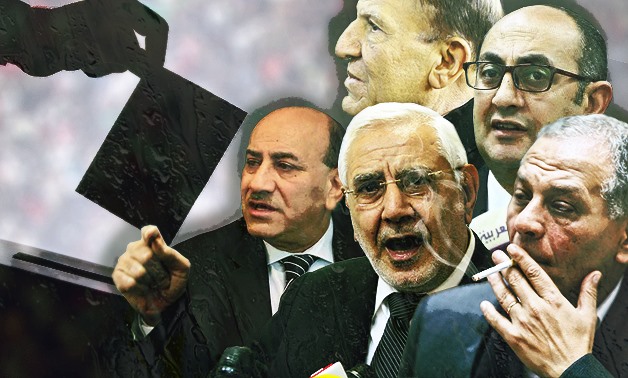
Five political figures released a joint statement calling for Egyptians to boycott Elections - Photo combined by Egypt Today/Mohamed Zain
CAIRO – 31 January 2018: On the same day the candidacy period for the 2018 presidential election closed, five political figures released a joint statement calling for Egyptians to boycott the process for doubting the pretense of fair elections.
The figures include former member of the outlawed Muslim Brotherhood and chairman of Strong Egypt Party, Abdel Moneim Abou El Fotouh, who ran for president in 2012 and got the fifth of votes at first round; former parliament member and chairman of the Reform and Development Party Mohamed Anwar Al-Sadat; former science consultant for the presidency Essam Heggy; former chairman of the Central Auditing Authority Hisham Genena; and political science professor Hazem Hosni.
The last two would run in the upcoming election as vice-presidents of former Chief of Staff Major-General Sami Anan, who was disqualified as he was under call-up service
(not civilian) and for forging documents indicating otherwise to be registered in the electoral database.
Sadat issued a statement on Tuesday claiming that he could not reach parliament members to receive 20 endorsements to run for office, questioning how candidate Moussa Mostafa Moussa managed to get them. However, he did not mention whether he attempted to resort to the other option, which is collecting 25,000 endorsement forms or more by citizens from at least 15 governorates.
In their statement, those politicians implicitly referred to the ongoing economic reforms as “an attempt to impoverish the people” because of their short-term harsh impact on citizens.
These reforms consisted of the currency flotation, substituting the 12-percent sales tax with the 14-percent VAT, and getting loans in billions of dollars to execute infrastructure and mega projects, as well as strengthening the social security network and alleviating the impact of inflation, which fell to 22 percent a few months ago from 33 percent.
Egypt’s economic reforms have been backed by the IMF and the European Bank for Reconstruction and Development (EBRD), among others. Jihad Azour, director of the Middle East and Central Asia Department at the IMF, expected the economic growth rate in Egypt to exceed projections hitting about 5 percent in 2018, according to MENA.
Moody's expected in mid-January that Egypt's economic growth will accelerate to around 5 percent by 2019 and 5.5 percent by 2021, in comparison with 4.2 percent in 2017, as structural reforms support more broad-based activities compared to the mostly consumption-driven pre-reform growth model.
Dissatisfaction with the political scene
The five political personnel expressed in the statement their discontent with alleged security and administrative practices undertaken to inhibit competition in the upcoming election.” However, they did not mention any details about the allegations.
As for rights lawyer Khaled Ali, Egypt’s National Election Authority (NEA) denied his allegations on Thursday, after he had withdrawn from the presidential race on January 24 when he described the election timeline as “unjust” and accused the authority of preventing him from receiving his endorsements signed by citizens.
The NEA clarified that the candidate himself or his representative must submit forms of endorsements that he received from the citizens to the NEA, saying, “it all depends on the candidate to shoulder the responsibility of submitting his endorsement forms to the NEA.”
The number of citizens eligible to vote in the presidential election due in March is 58 million; names can still be excluded or added as per legal guidelines.
The NEA announced the 2018 presidential election timetable on January 8. Potential candidates were allowed to submit their applications between January 20 and 29. The primary list of candidates will be announced on Wednesday, January 31, while the final one will be out on February 24 after validating documents and deciding upon appeals.
Voting will take place for three days, starting March 26 domestically, while it will begin on March 16 for expats from 9 a.m. to 9 p.m. in each country’s local time. The winning candidate will be announced on April 2.
The two known candidates until now are incumbent President Abdel Fatah al-Sisi and Chairman of Al Ghad Party Moussa Mostafa Mousa. The latter also chairs the Egyptian Council of Arab Tribes and holds bachelor’s and master’s degrees in architecture from the National School of Architecture in Versailles, France.

Chairperson of El Ghad Party Moussa Mostafa Moussa in a press conference after running for Presidetial election, on Monday, 29 January 2018- Egypt Today/Hussein Tallal
Sisi, Egypt’s sixth president, was elected to office in June 2014 after the June 30 uprising that toppled former President Mohamed Morsi, a leader of the now-outlawed Muslim Brotherhood.


Comments
Leave a Comment